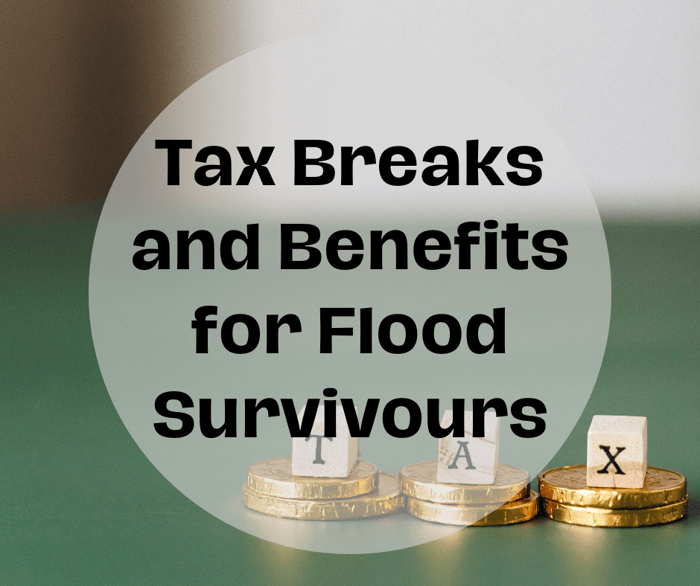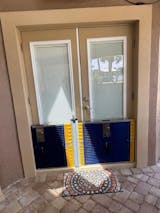Flooding is one of the most destructive natural disasters out there, leaving families and businesses struggling to cover damage costs. But many people don’t know about the financial aid, tax breaks, and grants available specifically for flood victims. In this article, we’ll break down these options for homeowners, business owners, and renters so you can get the support you need.
Flood Relief for Homeowners
If your home was damaged in a flood, there are several ways to get help—through tax deductions, grants, and other relief funds.
Tax Breaks for Flood-Damaged Properties
Homeowners can get a tax deduction for flood damage through a program called “casualty loss deduction.” Here’s how it works:
- What is it? A casualty loss deduction lets you deduct some of the repair costs from your federal taxes, which lowers your tax bill.
- How to apply: Gather receipts for repairs and any other expenses, like new appliances or flooring. When filing taxes, you’ll need to fill out IRS Form 4684, “Casualties and Thefts.”
- Important note: Only costs not covered by insurance qualify, so if you have flood insurance, this deduction will apply to the out-of-pocket expenses only.
FEMA Individual Assistance Program
FEMA (Federal Emergency Management Agency) offers grants to homeowners affected by floods. Here’s what to know:
- What does it cover? FEMA grants can pay for repairs, temporary housing, or other emergency needs.
- How to apply: Go to disasterassistance.gov or call the FEMA Helpline. You’ll need your Social Security number, insurance information, and a description of the damage.
- Processing time: It can take a few weeks to hear back, so apply as soon as possible after the flood.
State and Local Grants
Some states offer additional funds specifically for flood victims. Here’s how to find out what’s available:
- State programs: Each state is different, so check your state’s emergency management website for flood recovery grants.
- Examples: Texas has the Rebuild Texas Fund, and California has disaster grants that sometimes cover flood-related damage.
- How to apply: Each program has unique requirements, but most require proof of damage, income details, and sometimes a statement about why you need the assistance.
Flood Relief for Business Owners
For businesses hit by flooding, there are several grants, tax breaks, and low-interest loan programs that can help you recover.
SBA Disaster Loans
The U.S. Small Business Administration (SBA) offers low-interest disaster loans to businesses of all sizes. Here’s a rundown:
- What is it? SBA disaster loans can be used to repair or replace damaged property, machinery, and even inventory.
- Loan details: Interest rates vary, but they’re generally much lower than commercial rates. You can borrow up to $2 million.
- How to apply: Go to the SBA website and start your application there. You’ll need to provide basic financial info and proof of damage, like photos or repair estimates.

IRS Casualty Loss Deduction for Businesses
Just like homeowners, businesses can get a tax break through the IRS casualty loss deduction. Here’s how it works:
- What does it cover? This tax deduction allows you to deduct property loss and damage from your taxes, reducing your taxable income.
- How to apply: Keep a record of all flood-related expenses, like repairs and inventory losses. File IRS Form 4684 with your business taxes.
- Important tip: Unlike homeowners, businesses can also include losses to inventory and other operational costs in their deduction.
Private and Nonprofit Grants
Many nonprofit and private organizations offer grants to help small businesses rebuild after disasters. Here are some popular options:
- American Red Cross: Sometimes offers disaster relief grants to small businesses.
- Local Chambers of Commerce: Some local chambers set up disaster relief funds for businesses in their area.
- How to apply: Applications vary by organization, but most require a written statement of damages and proof of your business’s income before and after the flood.
Financial Aid for Renters
Renters can also face a serious financial hit from flooding, even if they don’t own the property. Here are a few ways to get help with costs like replacing personal property and finding new housing.
FEMA Renters Assistance
FEMA offers support specifically for renters impacted by floods, so you don’t have to face it alone.
- What does it cover? This program can cover temporary housing costs, repairs to essential household items, and replacement of personal belongings.
- How to apply: Go to disasterassistance.gov or call the FEMA Helpline. You’ll need basic details about your income, living situation, and flood-related losses.
- Tip: If you’re forced to move due to damage, keep receipts from moving and temporary housing costs to submit for reimbursement.
Tax Break for Casualty Loss on Personal Property
Even if you’re renting, you may qualify for a tax deduction for damaged or destroyed personal belongings. Here’s what to know:
- What qualifies: Furniture, electronics, and clothing that were damaged can all be included in this deduction.
- How to apply: File IRS Form 4684 when doing your taxes. Note that you’ll need to subtract any insurance coverage or aid from FEMA before calculating the amount.
- Important note: Not all expenses qualify, so it’s a good idea to consult a tax professional if you’re unsure about what you can deduct.
Nonprofit Assistance Programs
Some charities offer relief specifically for renters who are facing hardship after a flood. Here’s a quick guide to finding these resources:
- Local churches and community centers: Many offer grants or donations to help renters replace household items.
- The Salvation Army and Red Cross: Both organizations often help with rent, deposits, and essentials for those displaced by floods.
- How to apply: Visit your local branch or go to their websites. Applications are usually quick but require proof of income and sometimes a statement of loss.
Additional Tips for Flood Victims
No matter your situation, these additional tips can help you get more from the aid available to you:
- Document Everything: Take photos and videos of all damages, including personal property, home structures, and landscaping. This proof is crucial when applying for both insurance and government assistance.
- Keep All Receipts: Save every receipt related to flood expenses, from hotel bills to repair services. Many aid programs require these for reimbursement.
- Don’t Wait: Apply as soon as possible, as some programs are “first come, first served.” Immediate action can improve your chances of getting approved.
Final Thoughts
Flooding can be devastating, but there’s more help available than many people realize. Between federal grants, state assistance, tax breaks, and nonprofit support, there are options out there for homeowners, business owners, and renters alike. Taking the time to research and apply for these benefits can lighten the financial load, helping you rebuild your life and property more easily.
If you or someone you know has been affected by flooding, share this guide to help them get the assistance they deserve.



















